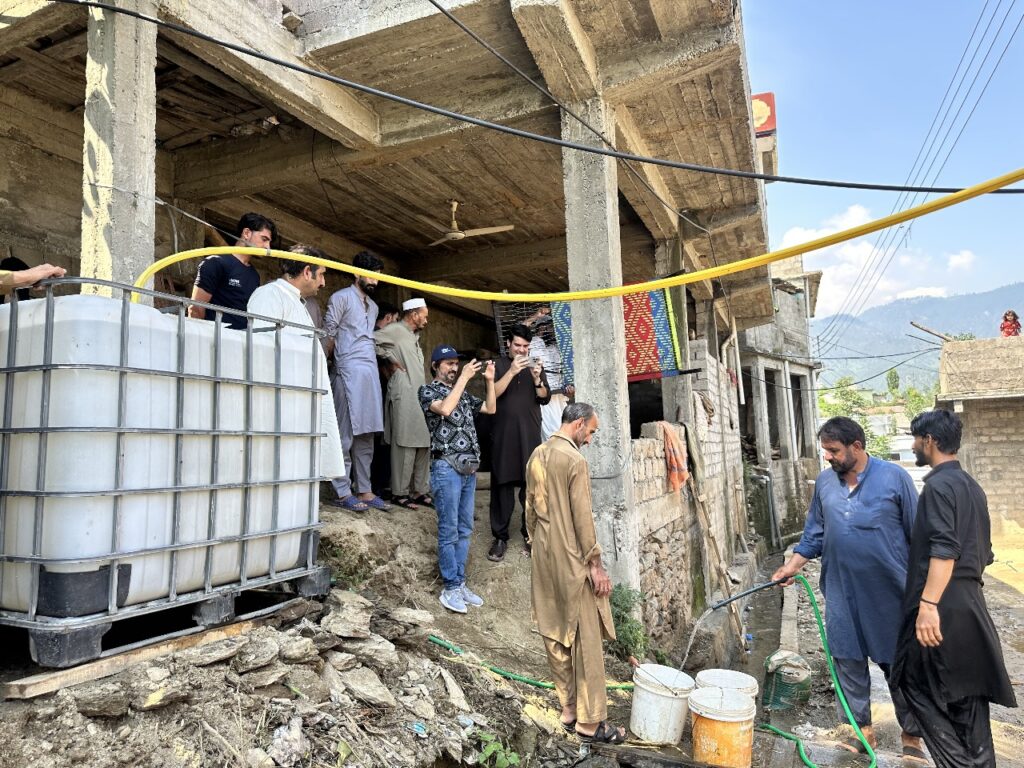PESHAWAR – In the high, folded mountains of Mansehra, water has always been elusive. For decades, communities perched above the Seran river lived with the exhaustion of scarcity. Families would descend steep slopes several times a day, fill metal pots from the river, and climb back up—each journey a reminder of the daily labour of survival.
Now, in villages like Achrial, a modest environment friendly technology is rewriting this story. The hydraulic ram pump, recently installed under a pilot programme, has altered the rhythms of life, delivering water from the Seran river to homes some 300 feet above. For families who once measured their days by the number of trips they could make to fetch water, the innovation has the texture of a quiet revolution.
The Labour of Water
For 65-year-old Saeed Khan of Achrial union council, the memory of those years is still raw. “Every day, I climbed the slope five or six times, carrying water from the river. Each climb broke my back,” he said. There was no alternative—without the river, there was no water. Now, with the pump humming away unseen, he and dozens of families like his no longer bear the same burden.
But the relief is felt most sharply among women. In rural Mansehra, water collection was a task assigned almost entirely to them. “For half a century I carried pots of water uphill,” recalled 55-year-old Akbar Jan. Her home sits on a ridge above the river. “Going down took ten minutes, reaching the river another five. Carrying a gallon of water back up cost half an hour.” She paused, remembering what this daily labour meant. “It was not just physical work—it reminded us of inequality, of poverty, of what we did not have. We longed for every drop.”
Her neighbour, Muhammad Younas, said simply: “Our women are the happiest. Now, they don’t need to go down the mountain at night, or in the day.”
A Technology Without Fuel
The hydraulic ram pump is deceptively simple. Unlike diesel engines or solar panels, this environment friendly technology requires neither fuel nor electricity. It uses only the kinetic energy of flowing water, sending it uphill through pressure—a system as old as nineteenth-century Europe but nearly forgotten in modern South Asia.
Installed by the International Water Management Institute (IWMI) under its Water Resource Accountability in Pakistan (WRAP) project, supported by the UK’s Foreign, Commonwealth & Development Office (FCDO), the technology is being presented as a climate-friendly alternative.
“It does not depend on fuel or solar power,” said IWMI senior researcher, engineer Kifayat Zaman. “It only relies on the natural force of water to lift itself 300 feet. That makes it sustainable. In the context of climate change, it matters that we can supply water without adding to greenhouse gas emissions.”
Women’s Lives, Changed
For many women, the pump represents more than convenience. It frees time, energy, and dignity. Carrying water had meant missed opportunities for education, health, and livelihood. The new system, by easing that weight, is reshaping gendered life in these mountain settlements.
“This technology is about more than water,” said researcher Naqqash Abbasi of IWMI. “It is about women, about equality, about sustainable rural life.”
From Survival to Cultivation
The impact stretches beyond households. For farmers, water supply can shift the entire local economy. Muhammad Shafqat, a farmer in Achrial, put it plainly: “We have land, but we depended on rain. Now, we can grow vegetables and fruit.” Already, he uses the water not only for crops but also for livestock, washing, and domestic needs.
Four pumps have been installed so far, in a pilot phase. Their success has encouraged IWMI to prepare recommendations for the provincial government, urging wider adoption across Khyber Pakhtunkhwa’s rain-fed zones. The proposal is not just about technology but about resilience—building communities that can withstand the shocks of climate change without falling deeper into poverty.
The pumps also speak to a model of development that resists dependency. The design is simple enough for local communities to install and maintain themselves. No foreign parts, no specialist engineers, no fuel imports. Just water, pipes, and gravity.
The Politics of Water
In the uneven history of rural development in Pakistan, water projects often arrive as promises and leave as ruins. Diesel pumps break down, solar panels remain too expensive, and piped schemes collapse under corruption or neglect. But this environment friendly technology, by stripping away the need for external energy, reduces the risks of dependency and failure.
For now, its presence is limited, its effect concentrated in a few villages. But the idea carries a certain symbolic charge—proof that adaptation is possible, that technology can be both modern and humble, that climate change does not have to mean despair.
For women like Akbar Jan, the pump has already redefined the landscape of life. Where once she measured her days by half-hour climbs, now she measures them by what is possible beyond survival.
Experts say the technology has potential to secure food, reduce migration, and build resilience in barani (rain-fed) areas. As climate stresses deepen, the pumps may offer not just water, but a model for a future where rural communities claim their own resources—cleanly, cheaply, and with dignity.
In the mountains of Mansehra, the Seran river still runs, as it always has. But now, for the first time in generations, it runs uphill too—powered not by fuel or electricity, but by the promise of environment friendly technology.











